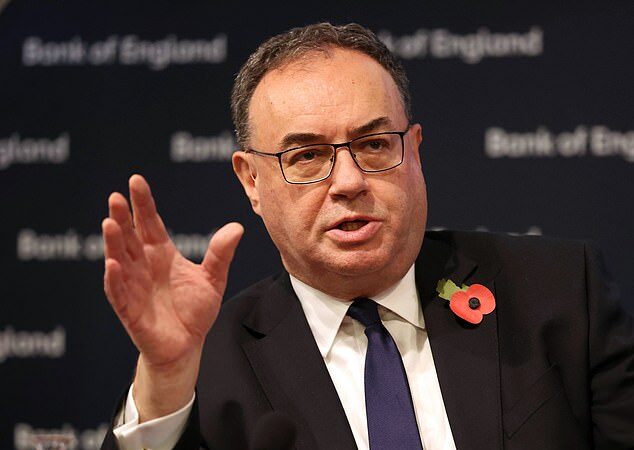
- Treasury Select Committee warns Bank about concerns over digital currency
- These include fears that UK may be more susceptible to bank runs
- There is also a risk of higher interest rates on lending
A digital currency for Britain – dubbed Britcoin – could cause financial instability and put customers’ personal data at risk, MPs have warned.
A Treasury Select Committee report published last night warned the Bank of England about concerns they had over a state-backed digital currency.
These include fears that the UK may be more susceptible to bank runs in times of economic uncertainty if customers are able to switch large amounts of deposits into the digital currency.
MPs said: ‘Switching large amounts of bank deposits into digital pounds quickly in times of market turmoil increases the risks of bank failures.’
There is also a risk of higher interest rates on lending as banks attempt to make up for lost deposits from savers who will shift their cash to digital pounds.

Hands on: Bank of England governor Andrew Bailey
As a result, the committee has proposed that the limit individuals are allowed to hold of the currency should be less than £10,000.
The Bank of England and Treasury have been working on a so-called central bank digital currency, which they hope will be launched by 2030. Britcoin would be a type of money issued by the Bank for day-to-day spending, both in-store and online.
The Treasury has previously stressed that the potential currency is not a crypto-asset, which are privately backed investments.
Unlike contactless payments – which are transactions between bank accounts – ‘digital pounds’ would be stored on devices, such as phones, and transferred directly.
The committee said in the report: ‘While there are some potential benefits, their extent is unclear. It is important to guard against risks in the fundamental design of the digital pound.’
The report warned that the currency could be very traceable and give authorities access to more data about customers.
‘The Bank of England and Government state that it is not their intention to be able to access users’ data, but they may in future be tempted to try to make use of such a powerful source of information,’ the MPs said. The committee has also warned that the introduction of a digital pound could end up speeding up the ongoing demise of physical cash.
This would further isolate individuals who are still dependent on it.
Figures from UK Finance, the banking and finance industry lobby group, suggest that as many as 900,000 people in Britain mainly use cash for payments.
Trasury committee chairman Harriett Baldwin said: ‘The digitisation of money can’t, in any way, leave those people behind.
‘I would urge the Bank to proceed with caution and maintain a genuinely open mind as to whether one is actually needed.’
And an important factor in the decision of whether to launch the digital pound will be the cost of building the infrastructure behind it, the MPs said.
The cost of the central bank digital currency ballooned to £8m in 2023, according to the Bank of England’s annual report and accounts – up from £5m in 2022.
The ongoing work on this currency is ‘likely to be very expensive,’ the committee said.
Around 130 countries are exploring the potential of a digital currency, according to the Atlantic Council think tank, including the US and China, as well as the eurozone.
So far 11 countries have launched one and 21 are piloting one.
In a joint statement, the Treasury and Bank of England said it welcomed the MPs report, adding: ‘We have always been clear a digital pound would only ever be introduced alongside cash, and that protecting individual privacy is paramount in any design.’





